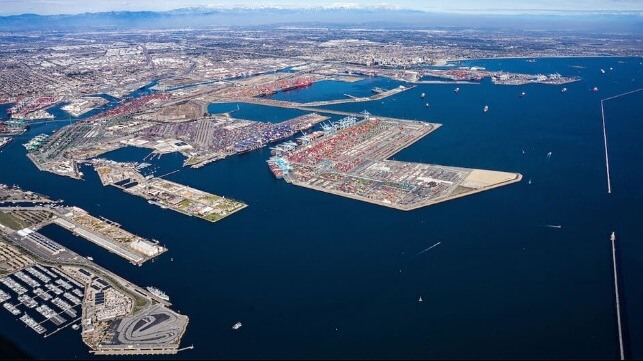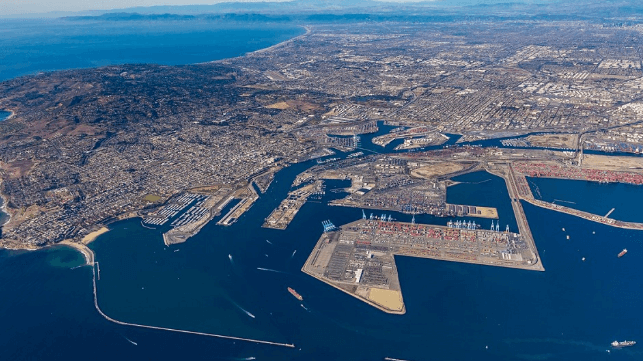WHEN CAPITALI$M NEEDS THE STATE
Shippers Calls for Biden to Intervene to Reopen West Coast Ports

With uncertainty over how long and how wide the disruptions will be in the current labor unrest at the West Coast ports, the National Retail Federation and National Association of Manufacturers are now calling for the Biden administration to engage with the parties to help them finalize a new contract. The retail trade group earlier this year joined with more than 230 associations calling for the administration to help with negotiations and bring certainty to the ports. Fears are rising among the associations as the disruptions that started last Friday drags on and after a similar 24-hour disruption two months ago.
The public statements from the retails and manufacturing associations came as the labor action stretched into its fourth day with conflicting reports as to how widespread the impact was on operations. The Port of Los Angeles Tweeted, “Container terminals are open and operating today with appropriate staffing,” which got an immediate reply message “not normally,” saying appointments were still being canceled “due to no one working the cranes.”
One of the terminal operators at the Port of Long Beach closed for the day after reporting over the weekend that they were experiencing labor shortages. Daily employees from the union are reportedly not showing up for work with the individual terminals deciding if they will operate or in the case of Total Terminals International they told customers that they were canceling Monday morning appointments and planning to remain closed for at least part of the day. Port of Long Beach Executive Director Mario Cordero said in a statement that the port was open today, although two terminals elected to close. He expected the terminals would both reopen for Monday's evening shift.
Late on Monday, the Pacific Maritime Association representing the employers issued a follow-up statement saying that the ILWU continues to stage concerted and disruptive work actions that have slowed operations at key marine terminals at the port of Los Angeles, Long Beach, and elsewhere on the West Coast, including the port of Oakland and Seattle. "Union leaders are implementing many familiar disruption tactics from their job action playbook," writes the PMA. They cited "refusing to dispatch workers to marine terminals, slowing operations, and making unfounded health and safety claims."
Shippers have begun to speak out fearing the repercussions and the growing uncertainty around the current action.
“The United States ports, particularly those on the West Coast, play a critical role in the vitality of the American economy,” said David French, Senior Vice President of Government Relations for the NRF in a prepared statement. “Thousands of retailers and other businesses depend on smooth and efficient operations at the ports to deliver goods to consumers every day. As we enter the peak shipping season for the holidays, these additional disruptions will force retailers and other important shipping partners to continue to shift cargo away from the West Coast ports until a new labor contract is established. It is imperative that the parties return to the negotiating table. We urge the administration to mediate to ensure the parties quickly finalize a new contract without additional disruptions.”
In addition to the retailers, the National Association of Manufacturers is now calling for the Biden Administration to also get more directly involved. Jay Timmons, President and CEO of the manufacturers' association Tweeted, "Manufacturers implore the White House to bring negotiating parties together and reopen America’s shipping gateways on the West Coast."
The NRF had previously forecast that retailers would continue to slowly build their import volumes in the second half of 2023. Analysts have pointed to retailers' high inventory levels as one of the factors contributing to the slowdown in container volumes at the ports and U.S. imports overall.
The current disruptions at the West Coast ports come as retailers typically prepare orders and plan shipments in advance of the “return to school” retailing season and then their sales leading up to the end-of-year holidays. The Port of Los Angeles had forecast even after a labor agreement was reached it would take several months for retailers and other shippers to bring volumes back to the West Coast ports. The disruptions of the past few days, and increased uncertainty, are likely to contribute to further declines in volumes and more rerouting of shipments to the U.S. Gulf and East Coast ports.
Longshore Workers Continue to Disrupt West Coast Port Operations

Terminals at U.S. West Coast ports are continuing to experience “no shows” and a shortage of staff with uncertainty over the current dispute between the Pacific Maritime Association and the International Longshore and Warehouse Workers union. CNBC is reporting that some terminals are advising truckers and shippers that they will be closed again on Monday, while the union and port officials continue to say operations are continuing.
CNBC reports it obtained a copy of an email sent by Total Terminal International advising truckers that it was canceling appointments for both ships at its terminals in Long Beach and Seattle. In addition, CNBC is reporting that union members have continued not to show up for work at the Port of Oakland since Friday morning.
It will be the fourth day of disruptions in the operations since ILWU members began not showing up for work. No one is officially saying they are on strike, but reports are indicating that the daily workers are not reporting to fill in as needed at the terminals leaving the terminals to operate short staff or opting to close.
The Port of Long Beach issued a statement on behalf of its Executive Director, Mario Cordero, addressing the current situation and the labor contract negotiations. “All container terminals at the Port of Long Beach remain open,” says the statement dated June 2. “As we monitor terminal activity, we urge the PMA and ILWU to continue negotiating in good faith toward a fair agreement.”
There have been no further public statements from either the union or the association representing the employers since they traded public remarks on Friday. The PMA said the union was “staging concerted and disruptive work actions,” impacting terminals ranging from the ports of Los Angeles, Long Beach, and Hueneme in southern California as well as moving north along the coast at Oakland, Tacoma, and Seattle.
The ILWU Local 13, which covers the Southern California ports, said in its statement, “cargo operations in the ports continue as longshore workers remain on the job,” while saying it was fighting for respect from the foreign-owned ocean carriers and terminal operators.
Union headquarters in its statement refuted claims that the contract negotiations had broken down. They said “We are getting there,” while saying “We aren’t going to settle for an economic package that doesn’t recognize the heroic efforts and personal sacrifices of the ILWU workforce that lifted the shipping industry to record profits.”
The Marine Exchange which oversees the movement of vessels in and out of the Southern California ports commented late on Friday that it was “a confusing day.” Captain Kip Louttit in his update said “Vessel traffic is still moving per schedules and no schedules have slipped,” while citing the media reports of terminals closing in the ports as well as at Hueneme and Oakland.
Louttit highlights that 72 vessels have registered with the management system as either being en route to the ports of Los Angeles, Long Beach, or Oakland, or as of June 1 scheduled to begin their voyage within 24 hours. The number of vessels bound for the southern California ports is 61, 10 more than the prior week, with the Marine Exchange saying it would revert to its voluntary queuing system if a backlog begins to build. Vessels would be asked to remain at least 20 miles from the coast “until they are reasonably certain they have a berthing assignment within three days.” If there is a labor shortage, the Marine Exchange is saying labor would be assigned based on the vessel's calculated date/time of arrival on the Master Queuing List for the ports, allocating labor as was done during the 2021-2022 backup.
No comments:
Post a Comment